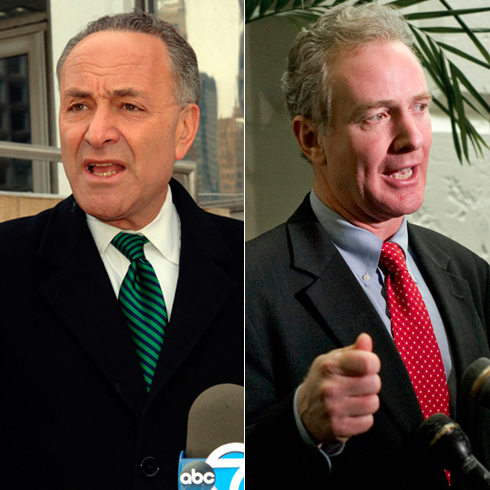Democratic leadership today released the first details of legislation aimed at swiftly responding to the Supreme Court’s decision in the Citizens United case, calling for strict disclosure for corporations who get involved in political adversiting.
“If we don’t act quicikly the court’s decision will have an immediate and lasting impact on this fall’s elections,” said Sen. Chuck Schumer (D-NY), who said he will introduce the bill after the Senate recess this month.
Rep. Chris Van Hollen (D-MD) will drop the partner legislation in the House.
An Obama administration official told TPMDC the White House has played an “active role” in talking with Capitol Hill about how to respond to the decision, which both Republicans and Democrats have told pollsters they don’t like.
White House staffers spoke with Democratic aides, and the administration believes the draft is “an important first step that outlines commonsense solutions to the problems created by the Supreme Court’s decision,” the official said.
“The White House has been very much involved … [and is] generally supportive of these provisions,” Schumer said.
Schumer framed the new bill as “beginning to pick up the pieces” even though so far no Republicans have signed on to assist with getting the legislation passed in a timely manner.
He said he hopes the draft will generate interest over the recess and then GOP co-sponsors. Public Campaign said in a statement the measure doesn’t go far enough.
Van Hollen pointedly noted that Sen. John McCain, once known as a champion of campaign finance reform, had said he was “disappointed” by the high court’s decision. McCain (R-AZ) also said he wasn’t sure what could be done about it, and the Democrats said they think their legislation is the answer.
The legislation has a deadline for action and Washington state law was loosely used as a blueprint for the bill, Schumer said. Read the summary of the draft here.
Among the highlights:
* The measure would block companies that have received government bailout funds or government contracts from “spending unlimited amounts” on political ads. For example, firms such as AIG should not be able to use taxpayer funds for such advertising. “That’s just wrong and we want to make sure that doesn’t happen,” Van Hollen said.
* Aims to make sure the law “will drill down deep, so the real person who put forward the money is disclosed,” Schumer said.
* Political candidates would be allowed “reasonable acess to television time” as well.
* Contains provisions so corporations can’t put their resources into a shell company or a larger organization such as the Chamber of Commerce to escape detection.
* Corporations would have to disclose spending on their Web sites within 24 hours and to shareholders with quarterly filings.
* In the case of joint expenditures from multiple firms, the CEO shown in the ad would be determined by whichever company put in the most cash. If the spending was equally divided, it would be determined by a “coin flip,” Schumer said.
* It also applies to labor unions, 501(c)3s, 501(c)4s and 527 groups.
Additional reporting by Evan McMorris-Santoro.









